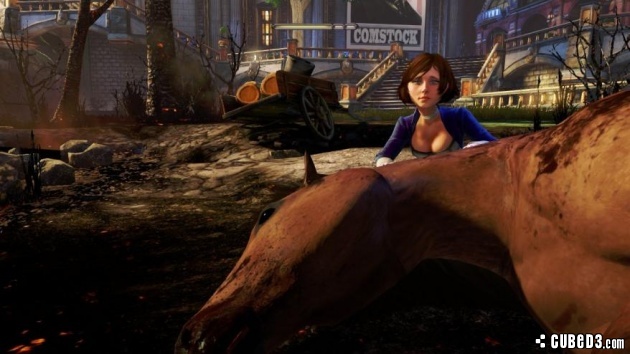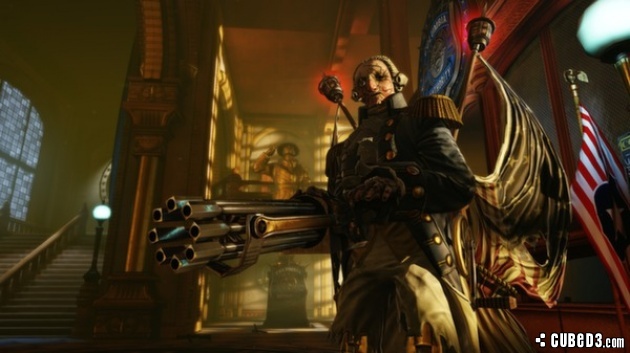BioShock Infinite (Xbox 360) Review
By Jacob  07.07.2014
07.07.2014

It's hard to play other first-person shooters after BioShock Infinite. Everything else feels small-minded and lacking in ambition. With each new first-person shooter release, gamers are promised better graphics, better online play, and "polished" gameplay. However, there's often a detail that's painfully lacking: real imagination and creativity. The first-person shooter has arguably innovated and grown more than any other genre this generation, but over these last few years it's also become stagnant. This is what makes a game like BioShock Infinite so important, and which is why it is the perfect subject matter for this latest Cubed3 review.
BioShock Infinite's opening moments are reminiscent of the beginning of the original BioShock. The player starts on the open sea on his way to a lighthouse - an intentional homage to a game that proved the first-person shooter could make one think as much it makes one shoot. BioShock Infinite takes this premise to a new level. Without spoiling the story, players will once again be pleased with the tale Irrational has spun.
Part of why this story pulls off its ambitions so capably is the precision of the execution. The detail work is astounding. The city of Columbia is among the most the well-articulated settings video games have seen. It feels less integral and less entwined in the plot than the city of Rapture was, but it's a no less captivating venue to explore. There's a lot of time to be spent scrounging through the environment for cash and voxophones, Infinite's version of audio logs from the first game, but when the city is such a joy to explore this aspect of the game escapes the tedium that can plague lesser productions.

In truth, a lot of what makes this game compelling is this beauty. BioShock Infinite is downright gorgeous. It reminds of The Legend of Zelda: Skyward Sword in some ways, in that art design drives the game more than simple technical advancement. Make no mistake; the tech is here, with a modified version of the Unreal Engine 3 driving large vistas, floating environments, and some of the most gorgeous lighting of this generation, but there's more to the visual make-up than simple coding. Thankfully so, as well, since there are unfortunate (and frequent) frame-drops on Xbox 360 and occasionally low-resolution textures make an appearance. The console releases are definitely a step down from the PC version in both clarity and performance, but the consumer is still getting a stunning game on any platform.
The attention to detail paid to the art also extends to the sound design. Infinite is filled with more of those retro-songs that made gamers love the original BioShock. It even features some modern tunes that have been given an old-school feel. The voice work is also excellent, with every character giving a believable performance that gives life to the exceptional writing. The original soundtrack too possesses range and diversity, with some tracks being beautiful and resonant, and others delivering loud, pulse-pounding sounds that at times are reminiscent of The Shining.
The gameplay is probably the least altered aspect of BioShock Infinite. Those who have experienced the previous BioShock games will feel right at home with the series' usual combination of weapons and powers. Powers are called "vigors" this time around, and the manna for using these powers is renamed "salt," but the core concept remains. Players can now wield both weapons and vigors simultaneously - an improvement lifted from BioShock 2.

Strangely though, players are limited to only carrying two weapons at once this time around. This has been the general trend in first-person shooters over the last few years, but for a game that wants the player to experiment with combat, there's a stifling feeling in only being able to access two weapons at a given time. It forces the player to specialise in a few weapons instead of experimenting with the arsenal in unique ways. Some may argue it's unrealistic for the player to literally carry around a dozen weapons, but then how realistic is a floating, self-sustaining city?
This frustration aside, the gameplay is fun. BioShock Infinite won't move the first-person genre forward on the merits of its gameplay, but what's here is well executed and - aside from some drawn-out battles in the final act - well-paced. There's plenty of quiet time for the player to explore the environments and a good number of well-staged fire-fights to maintain the intensity. The player will find that Columbia is a less tense environment than Rapture, but this difference in tone makes sense. Make no mistake, Columbia is every bit as unsettling as Rapture - and perhaps more so at times with its subject matter of racism and jingoism all wrapped in a façade of religious righteousness - but the player won't wander the streets of Columbia in a pensive state wondering what lies in the shadows.
Part of the reason this is true is the AI companion, Elizabeth. It's hard to be afraid when she follows the player around Columbia chatting amiably, picking locks, and even finding the player useful ammo and salt in the heat of combat. Gaming hasn't before seen such a well realised companion. Those who fear Elizabeth will become a burden can rest easy: she's the best thing about this game. It speaks volumes to what Irrational has achieved that the player will actually miss Elizabeth in the parts of the story she is absent. She is no Ashley from Resident Evil 4, a character who was an encumbrance bordering on annoying. Elizabeth can handle herself thank you very much.

More than just tossing the player ammo, though, Elizabeth also has the unique ability to open tears in the environment. These tears can take the form of useful cover during fire-fights, gun turrets, decoys, and even hooks for the player's sky-hook tool. The player is likely familiar with this new traversal system, the sky-line, and it's every bit as fun as it looks in the trailers that have been released. Simple to hop on and off, the sky-hook allows the player to zoom through set-piece battles at blistering speeds engaging in aerial combat with unexpected aplomb. There was certainly some concern that this aspect of the game would come off rough and overcomplicated, but instead it is just one of many joys Infinite has to offer. Elizabeth herself will ride along the sky-line, animating fluidly as she hops from rail to rail maintaining pace with the player. Elizabeth is special, and this story is more about her than even the character the player inhabits, Booker Dewitt.
Whilst the first BioShock had a silent protagonist, Booker is a well-realised character who speaks and interacts. He struggles with his past sins and getting Elizabeth out of Columbia is his way of finding atonement and paying back old debts. Of course, it's never that simple in a BioShock game, and rest assured there are some shocking twists and turns to be had over the ten-plus hours of gameplay. It's no spoiler to say there are mind-bending elements to this story. The player comes in expecting to be surprised based on past experience with this series, but none-the-less Irrational succeeds in pulling off its climax with style.
It could be argued that Infinite's drawn-out conclusion is gratuitous, but frankly Irrational has earned the right to the story's extended victory lap. Those who take the time to absorb every detail of Columbia will appreciate the protracted ending that ultimately leaves the player feeling exhausted, contented, and wanting to immediately start over again from the beginning.

Cubed3 Rating
Exceptional - Gold Award

In the end, BioShock Infinite, like BioShock before it, is proof that games can be more than just games. It's proof that when a publisher has faith in the talent of its developers and gives them access to the resources they need, wonderful things can happen. Things that need to happen far more often if the dearth of creativity this genre is experiencing can hope to be reversed.
BioShock Infinite is an interactive masterpiece, and the last hour - with its stunning conclusion - actually elevates the game to a higher status than just the sum of its already impressive parts. This title will fill gamers with joy, but also disappointment that so little else achieves so much. One can only hope it's not another five years before players get to see what else Ken Levine and Irrational are capable of creating.

![]() 9/10
9/10
![]() 0
(0 Votes)
0
(0 Votes)
 Out now
Out now  Out now
Out now  Out now
Out now  Out now
Out now Comments
Comments are currently disabled

 Sign In
Sign In Game Details
Game Details Subscribe to this topic
Subscribe to this topic Features
Features






 Top
Top

